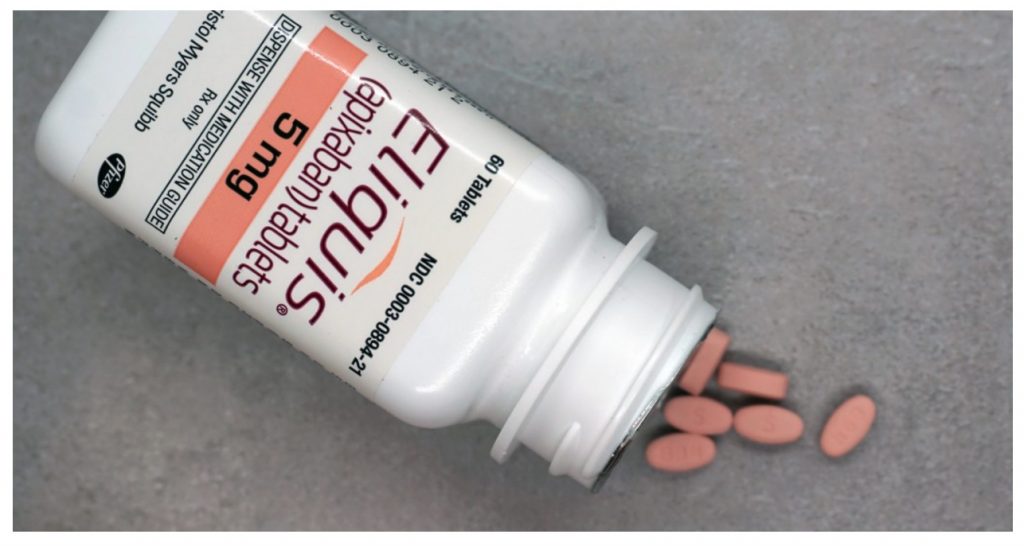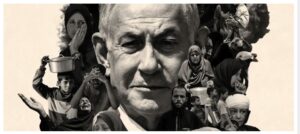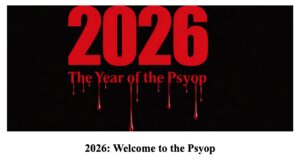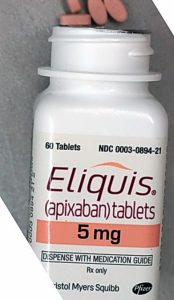By
Pfizer and Bristol Myers Squibb this month revived the “No Time to Wait” ad campaign urging people experiencing heart issues to visit their doctors. The two drugmakers developed and market Eliquis, the top-selling drug for the very heart conditions associated with people who received Pfizer’s COVID vaccine.
Two major pharmaceutical companies chose February, the month of love — or hearts — to launch an advertising campaign urging people experiencing heart issues for the first time to visit their doctors.
Pfizer and Bristol Myers Squibb (BMS) this month revived the “No Time to Wait” ad campaign, spending $1.28 million on TV ads alone.
The campaign warns anyone experiencing palpitations and shortness of breath that they may be at increased risk of developing atrial fibrillation (AF), deep vein thrombosis (DVT), other types of blood clots and strokes — the same types of cardiovascular ailments found among people who have received COVID-19 vaccines.
The campaign urges viewers to seek early medical attention in order to reduce the risk of these serious complications.
“Early medical attention” could include prescription drugs — including Eliquis, developed and marketed by none other than Pfizer and BMS.
According to industry publication Fierce Pharma:
“The aim is to get patients back into their doctors’ offices — and of course, if needed, be diagnosed with any relevant condition that may require them to take a blood thinner, such as Eliquis.”
Eliquis, described as a “blockbuster blood thinner and atrial fibrillation (AF) drug,” is a major revenue generator for the Pfizer-BMS alliance, delivering more than $9 billion in annual revenue — far more than competing drugs such as Xarelto (produced by Bayer in conjunction with Johnson & Johnson), and Pradaxa, produced by Boehringer Ingelheim.
Pfizer and BMS relaunched the “No Time to Wait” campaign in conjunction with several advocacy organizations and medical societies, including World Thrombosis Day, which expressed support for the Pfizer-BMS initiative as a means of “educating” the public.
Characterized as a “surround-sound campaign,” Pfizer-BMS use television, radio and social media to deliver the “No Time to Wait” message to the public.
As part of the campaign, a DVT and pulmonary embolism (PE) television advertisement debuted on Valentine’s Day, Feb. 14. The ad showed two patients describing how they “didn’t wait” to speak to their doctors about the AF, DVT and PE symptoms they had begun to experience while performing everyday activities.
Speaking to the camera, the two actors describe symptoms, such as shortness of breath and a racing heart, which are potential indicators of AF, DVT and PE.
Official campaign literature urges the public to take action:
“Right now, people may be weighing a decision to visit a healthcare provider. However, symptoms like swelling, pain, tenderness or redness in the leg, thigh or pelvis can possibly be related to a potentially serious condition such as deep vein thrombosis (DVT). It’s critical to not brush off these symptoms.”
BMS, via its spokesperson, described the reasons for relaunching the campaign:
“We received so much positive feedback from patients and advocates on the impact this campaign had on patients, we knew it was our responsibility to continue to evolve the program and further get the message out.
“In the middle of 2021, we decided to evolve the campaign, with new insight that symptomatic people at risk for AFib or DVT/PE can often dismiss their symptoms or misattribute [emphasis added] them to other health and lifestyle factors.”
Could “misattribute,” in this instance, actually refer to cases where those who had recently received a COVID vaccine experienced the onset of heart-related conditions, in some cases leading to their deaths?
Is Pfizer benefitting from vaccine-induced ailments?
Could the relaunching of the “No Time to Wait” campaign represent an effort by Pfizer to engage in damage control from the increase in vaccine-induced heart conditions — while benefiting from the sale of a drug used to address those same ailments?
There are several objectives Pfizer and BMS could accomplish with the campaign.
First, by launching an advertising campaign warning people they may be at risk of certain heart conditions, Pfizer and BMS are in a sense “naturalizing” heart ailments in young and/or healthy individuals.
Second, by “naturalizing” the prevalence and likelihood of such heart conditions, these companies may deflect blame for these conditions from COVID vaccines, including the Pfizer-BioNTech vaccine.
Third, by referring patients to their doctors, the Pfizer-BMS alliance may directly benefit financially from the increased prevalence of heart ailments and conditions in the vaccinated public — as doctors prescribe more Eliquis, the top-selling blood thinner and AF drug, to treat their symptoms.
‘Normalizing’ heart conditions in young and healthy
According to Pfizer and the Centers for Disease Control and Prevention (CDC), even “the healthiest athletes” are now at risk for blood clots, as stated in an urgent warning issued this month.
The media and health authorities in recent months have proffered multiple explanations for why healthy people are developing blood clotting and heart conditions, blaming everything from weather and energy bills to cannabis use — but not COVID vaccines.
Here are some examples:
- September 2021: The Times of India ran a story on a “doctors’ reminder” that “nobody is too young for a heart attack.”
- September 2021: A study indicated that cannabis use doubled the risk of heart attacks in young adults.
- October 2021: The New York Post reported on “[t]he little-known heart attack that’s striking ‘fit and healthy’ women as young as 22.”
- November 2021: British tabloid The Sun reported on “[t]he ways cold weather can affect your body — from winter vagina to blood clots.”
- November 2021: A Times of India report asked why heart attacks are “becoming common in ‘seemingly’ fit people.”
- November 2021: Healthline reported e-cigarettes can raise the risk of heart disease and stroke.
- December 2021: Another British tabloid, Express, warned about the “healthy” diet that “may ‘increase’ your risk of having a heart attack.”
- January 2022: Norton Health informed us that “[p]reventing heart disease in children is becoming more urgent as more kids develop heart disease.”
- January 2022: A report is published warning that “sports can break your heart in more ways than one.”
- January 2022: A report by CT (Connecticut) Insider indicated more people were suffering from heart disease and strokes “after COVID.”
- January 2022: The Daily Mail warned the “[r]isk of heart problems could be increased even if you drink less than NHS weekly units,” referring to recommendations made by the UK’s National Health Service.
- January 2022: The Sun ran a report claiming weather can “harm” one’s health, leading to heart attacks, stroke or gout.
- January 2022: Another report by The Sun warned 300,000 Brits were “living with [a] stealth disease that could kill within 5 years.” The “stealth disease” in question is aortic valve stenosis, a condition where the heart’s aortic valve narrows.
- February 2022: Nature magazine reported the risk of heart disease “soars after COVID — even with a mild case.”
- February 2022: A doctor interviewed on the UK’s ITV warned an increase in energy bill amounts may cause heart attacks and strokes.
Mark Crispin Miller, professor of media, culture and communication at New York University and founder of News from Underground compiled a list of reports like those listed above.
In looking at incidents and reports during the week of Feb. 8-14 alone, Crispin told readers:
“Before we note all those whose ‘sudden deaths’ made news just this past week — ‘unexpected deaths’ with no reported cause, or due to heart attacks, strokes, blood clots, cardiac arrest or swift, aggressive cancers (all known to be ‘adverse events’ post-‘vaccination’) — let’s review how this unprecedented global spike in sudden death has been deliberately obscured by ‘our free press.’”
Miller highlighted an ABC News report, “‘Broken heart’ cases surge during COVID, especially among women.”
In another example, Science magazine reported geneticists found the answer to “sudden unexplained child deaths.”
Downplaying of the connection between the COVID vaccines and serious heart conditions often has involved high-profile athletes.
For instance, 33-year-old soccer star Sergio Aguero of FC Barcelona was forced to announce his retirement in December 2021, after suffering chest pains and dizziness during a match in October 2021. He never played again.
According to Aguero’s cardiologist, the vaccine was not the reason for his ailment and retirement.
However, Aguero himself, in a Twitter question-and-answer session earlier this month, did not reject this possibility, stating: “I don’t know if Covid or [the] vaccine caused my retirement.”
Media, however, continue to promote the narrative that vaccines have nothing to do with the surge in sudden illnesses or deaths among athletes.
For example, Miller cited a Feb. 1 Washington Post article describing stories of athletes dying due to COVID vaccination as a “falsehood.”
Miller then compared what he described as the “disgraceful” Washington Post report with a documented timeline of athletes who suffered from heart failure between March 2021 and January 2022.
This string of incidents is further illustrated and detailed by the “Real Science” blog, which found 707 such incidents as of this writing and demonstrated in graphical form the sharp increase in heart failure incidents involving athletes over the course of 2021 and into 2022, as COVID vaccination uptake increased.
Nevertheless, Politifact, in December 2021, assured the public “[t]here’s no proof athletes collapsed with heart issues because of COVID-19 vaccination,” while in November 2021, U.S. News & World Report warned “COVID may trigger [a] heart condition in young athletes.”
As reports of vaccine-induced heart ailments rise, studies confirm link
Multiple studies and reports have confirmed a link between COVID vaccines and heart ailments.
These reports include:
- September 2021: A report found adolescent boys are at higher risk of hospitalization from the Pfizer vaccine than from COVID.
- November 2021: Renowned cardiologist Dr. Steven Gundry warned the Pfizer and Moderna COVID vaccines “dramatically increase” the risk of heart attacks.
- January 2022: Data from the Vaccine Adverse Event Reporting System (VAERS) indicates myocarditis tops the list of COVID vaccine injuries for 12- to 17-year olds.
Meanwhile, reports continue to grow of previously healthy people who develop heart conditions following COVID vaccines.
Here are just a few examples:
- June 2021: A 13-year-old Michigan boy died three days after receiving the second dose of the Pfizer COVID-19 vaccine.
- June 2021: An athlete who received the second dose of the Pfizer vaccine developed myocarditis, triggered by the vaccine.
- August 2021: A 14-year-old boy developed myocarditis after receiving the Pfizer vaccine.
- October 2021: A 17-year-old developed multisystem inflammatory syndrome and myocarditis after receiving the Pfizer vaccine.
- December 2021: A 26-year-old’s death from heart inflammation was found to have “probably” been caused by the Pfizer vaccine.
- January 2022: An autopsy found the death of another 26-year-old from myocarditis was the direct result of receiving the Pfizer vaccine.
- February 2022: A six-year-old developed vaccine-induced myocarditis, leaving him unable to walk.
- February 2022: Autopsies showed that the deaths of two teenage boys who died soon after receiving the Pfizer vaccine were directly caused by the vaccine.
Reports and studies like those listed above have led to increasing calls for the vaccination of minors to be reassessed or outright halted, including:
- January 2022: More than 30 experts called on UK regulators to reassess COVID vaccination for 12- to 15-year olds.
- January 2022: Data revealed reports of heart disease following COVID vaccines had increased 15,600% in young people under the age of 30, compared to the previous 31 years of heart injuries reported following receipt of FDA-approved vaccines.
They’ve also triggered calls for further scrutiny on the part of health authorities, which appear to have had some effect, at least in certain instances.
For example:
- October 2021: The U.S. Food and Drug Administration delayed a decision on green-lighting the administration of the Moderna vaccine to adolescents, citing heart problems (however, the Pfizer vaccine was nevertheless approved for the same age group).
- October 2021: Health authorities in Denmark and Sweden paused administration of the COVID vaccine to younger age groups, citing reports of myocarditis.
- December 2021: The CDC was monitoring eight cases of heart inflammation reported in 5- to 11-year-olds who received the Pfizer vaccine.
Nevertheless, in January 2022, the Centers for Disease Control and Prevention (CDC) refused to investigate the case of a 13-year-old who died of myocarditis days after receiving the Pfizer vaccine, while in August 2021, doctors “downplayed” the connection between the onset of myocarditis in a 25-year-old, and receipt of the Moderna vaccine.
‘No Time to Wait’ campaign spending indicative of broader Big Pharma marketing expenditures
Big-dollar ad spending is par for the course for Big Pharma companies such as Pfizer, as previously reported by The Defender.
For instance, a 2019 Forbes article reported Pfizer spent twice as much on marketing/selling as it spent on research.
Pfizer’s heavy advertising is also evident in its most recent quarterly report, for the fourth quarter of 2021. The report indicates a 10% increase — a total of $12.7 billion — in 2021 “SI&A expenses,” which include marketing and advertising, as compared to 2020, when there was no COVID vaccine available.
The report also projects Pfizer’s SI&A expenses will range between $12.5 and $13.5 billion in 2022.
BMS, in turn, spent $990 million in advertising and marketing in both 2020 and 2021 — after spending $633 million in 2019.
In sum, pharmaceutical ad spending totaled $6.58 billion in 2020, and was expected to surpass $11 billion by the end of 2021 — including $3.9 billion in spending on television advertisements alone.
In addition to “traditional” advertising and marketing campaigns, pharmaceutical companies adopted some more creative ways to promote their products — and perhaps purchase further goodwill on the part of media outlets.
In an October 2021 article, The Defender highlighted several examples of Pfizer sponsoring television news programs and segments, ranging from “Good Morning America” to “Anderson Cooper 360°” to “CBS HealthWatch.”
For example, an Oct. 4, 2021 tweet posted on CNBC’s official Twitter account portrayed Pfizer in glowing terms, accompanied by the text: “paid post for Pfizer.”
And a March 15, 2021 tweet by Pfizer expressed pride in the release of a National Geographic documentary, “Mission Possible: The Race for a Vaccine.”
The views and opinions expressed in this article are those of the authors and do not necessarily reflect the views of Children’s Health Defense.





DeSantis fail…disgusting.
https://thelibertyloft.com/2022/02/26/governor-desantis-sells-out-to-medical-industrial-complex-signs-bill-extending-immunity-for-following-cdc-dictates/
I have atrial fibrillation. The generic prophylactic for stroke is Warfarin. Warfarin didn’t bother me, but it has to be monitored monthly as it is very dose sensitive (critical) and is safe only within a very narrow window. Not enough can allow clotting, too much can cause bleeding that can’t be stop. I was prescribed Eliquis which does not need to be monitored, but suffered terrible side effects. It gave me terrific back pain which made it very difficult to do any yard work, and It was difficult to walk. People would see me out walking and think I was in immediate need of medical attention. I was wishing I was dead rather than having to live a life on Eliquis. I’ve since switched to Xarealto which is much more tolerable, but these drugs are very expensive. I’ve been told they run around $6.000.00 a month. Warfin was quite inexpensive, probably under $10.00 a month.
Another approach is fish oil, but that’s not an “approved” treatment for AFIB, although it worked well for me for 7 years,
This article is about people who are jabbed with a covid 19 vaxx. Many males develop heart conditions which can be serious and even deadly.
So these two drug companies suggest they take their Rx blood thinner pill Eliguis….see Ref. File photo. Isn’t this thoughtful. Give a person an experimental vaxx….then if they become ill, have a palliative pill waiting in the wings. The cynicism is off the charts.
Attachment